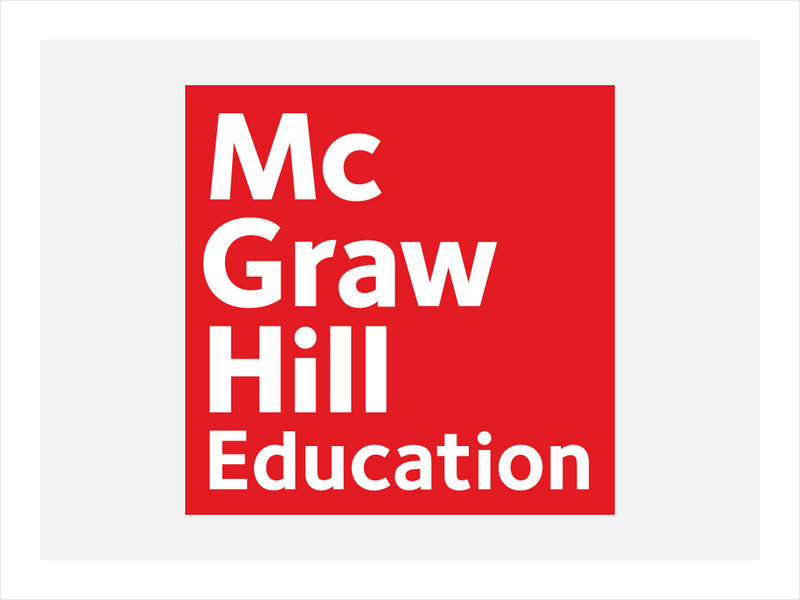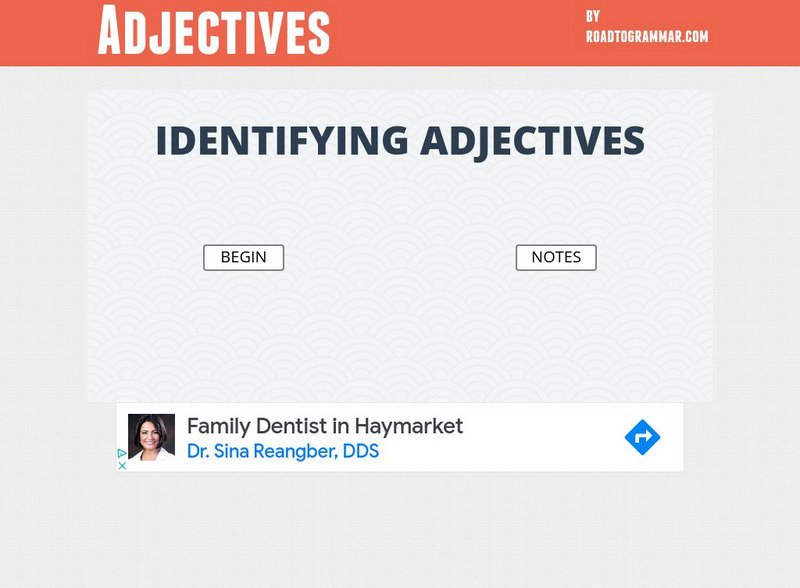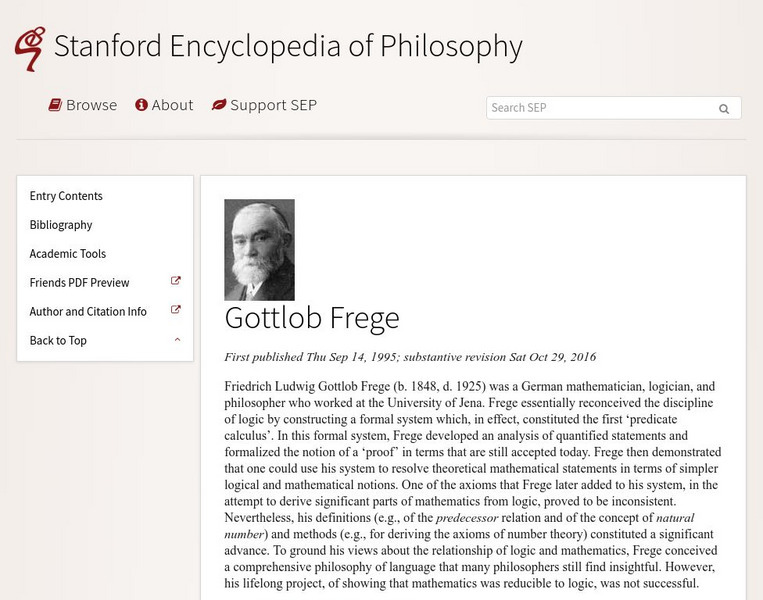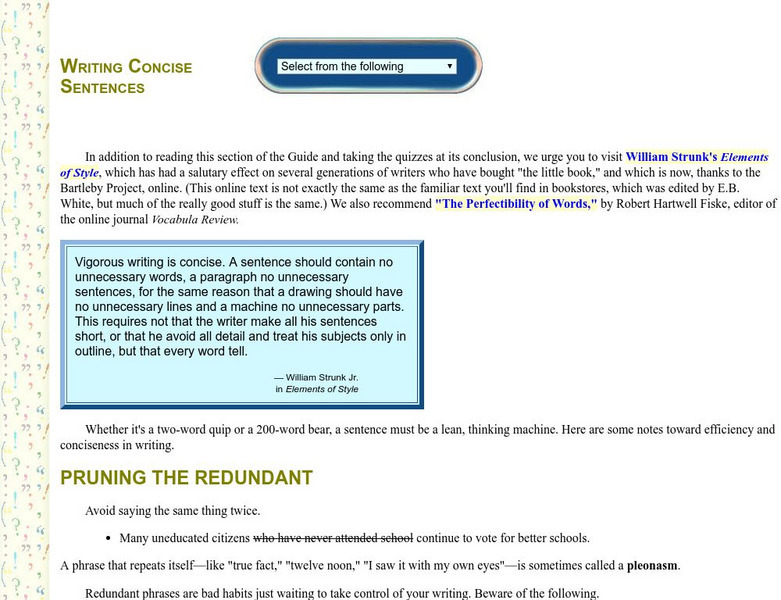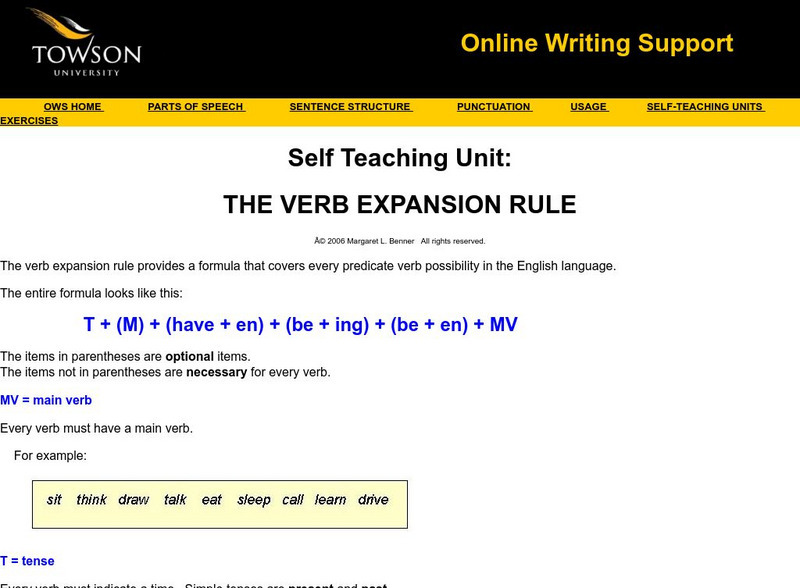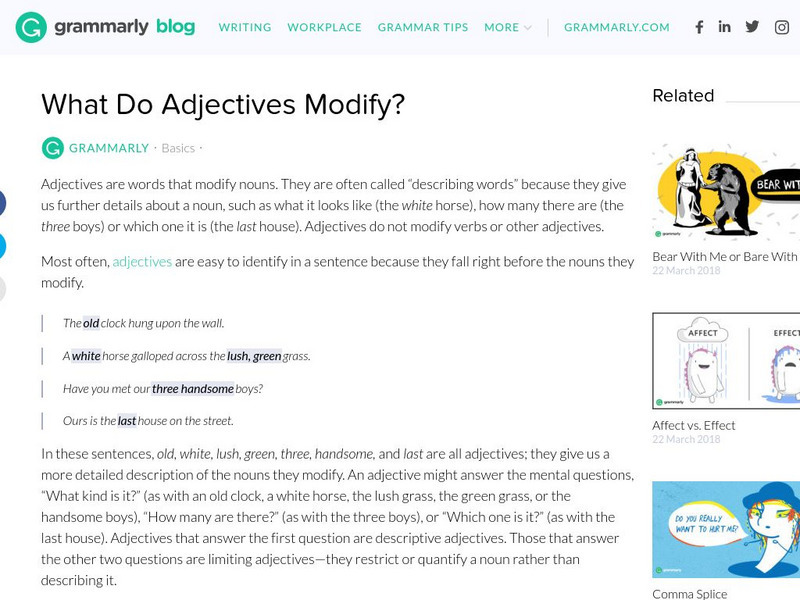University of Ottawa (Canada)
University of Ottawa: Parts of the Sentence
This University of Ottawa site overviews the parts of the sentence and then provides a list of links to the various individual parts including subject and predicate, objects and complements, noun, pronoun, phrase, clause, and a review...
ClassFlow
Class Flow: Sentence Intro
[Free Registration/Login Required] Students will be able to distinguish between sentences and fragments. They will also be looking at subjects and predicates.
McGraw Hill
Glencoe/mc Graw Hill: Writer's Choice: Revising Sentence Fragments
An exercise providing five sentence fragments that students are asked to revise and rewrite by adding a subject or a predicate. Students can check their answers when finished, and possible answer choices are provided.
Road to Grammar
Road to Grammar: Identifying Adjectives
In this interactive, students identify adjective in sentences by clicking on them; these include predicate adjectives.
ClassFlow
Class Flow: Combining Sentences
[Free Registration/Login Required] This flipchart contains opportunities to combine sentences focusing on subjects and predicates.
Quia
Quia: Simple Subjects & Predicates Rags to Riches Game
Based on the popular "Who Wants to be a Millionaire?" this game offers the chance to climb to each level, get hints and get feedback.
Blackdog Media
Classic Reader: The Categories by Aristotle
This is the full text of The Categories by Aristotle. The Categories places every object of human apprehension under one of ten categories (known to medieval writers as the Latin term predicament). Aristotle intended them to enumerate...
Capital Community College Foundation
Guide to Grammar and Writing: Abstract Nouns
The composition of a noun is more than just a person, place or thing. Use this resource to study examples of nouns and their many uses.
University of Sydney (Australia)
The Write Site: Practice 4: Sentence Fragments
This interactive lesson engages students in determining "why" each word grouping is a sentence fragment. The lesson involves moving a computer's mouse from each fragment to the reason the word grouping is an incomplete thought.
Stanford University
Stanford Encyclopedia of Philosophy: Gottlob Frege
Good summary of Frege's thought. Some sections are more technical, but the explanation of his philosophy of language and other sections are more readable.
Capital Community College Foundation
Guide to Grammar and Writing: Writing Concise Sentences
Why write five paragraphs when you can say what you want to say in two? Learn how to make the most of your words and sentences to get your point across without being too wordy.
Capital Community College Foundation
Guide to Grammar and Writing: Plural Forms
A good explanation of Plural Forms for the student. Site also offers a quiz at the end. L.11-12.2b Spelling
Sophia Learning
Sophia: Complete Subject
This lesson focuses on how to find the complete subject of a sentence; it defines simple and complete subject with examples, provides sample sentences with both the simple and complete subjects identified, and offers tips for how to find...
PBS
Pbs Learning Media: Learn About Dependent & Independent Clauses
A clause is a group of words that acts as a subject and a group of words that acts as a verb. A clause consists of a subject and a predicate, where the predicate is typically a verb phrase. [0:57]
University College London
University College London: Attributive and Predicative Adjectives
This University College London site provides an advanced grammar lesson on adjectives (attributive, postpositive, and predicate adjectives), and includes a short exercise to test your knowledge.
Texas Instruments
Texas Instruments: Given a Graph, What Is the Function?
Understanding how to associate a function of a parabola with its graph. Students will explore varies functions and determine its graph. They will then use what they learned to predicate where a particular graph of a different function...
Towson University
Towson University: Ows: Self Teaching Unit: The Verb Expansion Rule
This lesson focuses on the verb expansion rule which provides a formula that covers every predicate verb possibility in the English language. The formula is T + (M) + (have + en) + (be + ing) + (be + en) + MV. The lesson explains all of...
Grammarly
Grammarly Blog: Double Negatives: 3 Rules You Must Know
This page explains the 3 rules for double negatives: each subject-predicate construction should only have one negative form, a double negative is a non-standard sentence construction that uses two negative forms, and standard English is...
Grammarly
Grammarly Blog: What Do Adjectives Modify?
This blog article explains that adjectives modify nouns and provides examples. It also discusses predicate adjectives.
E Reading Worksheets
E Reading Worksheets: Senternce Structure Worksheets
In this learning module, students will learn more about various sentence structures. Reinforcement worksheets are provided. This module is designed to support Tier I, Tier II, and Tier III students via different instructional options.
Robin L. Simmons
Grammar Bytes: The Subject Complement
Printable information is provided that demonstrates how to identify a subject pronoun in the context of a sentence.
Capital Community College Foundation
Guide to Grammar and Writing: Sentence Fragments
This tutorial provides information about the sentence fragment. Several examples are provided to support the explanations. A PowerPoint is available on the site for additional tutorial information regarding sentence fragments and other...
Other
D'youville College: Core Parts of a Sentence
This online writing lab provides a series of examples on identifying one of the two main components of complete sentences, the subject and the verb. Correctly identifying these parts will result in the ability to write complete sentences.
Stanford University
Stanford Encyclopedia of Philosophy: Frege's Logic
Lengthy and detailed, but also quite technical, article explaining the major theorems of Frege's logic. Introduction gives a helpful overview and bibliography is included at end, but anyone without a background in logical notation may...
Other popular searches
- Subject and Predicate
- Complete Predicate
- Subjects and Predicates
- Simple Predicate
- Compound Subject and Predicate
- Subject Predicate
- Compound Predicates
- Complete Subject Predicate
- Simple Subject and Predicate
- Subject Predicate Agreement
- Predicate Adjectives
- Predicate Nominative


